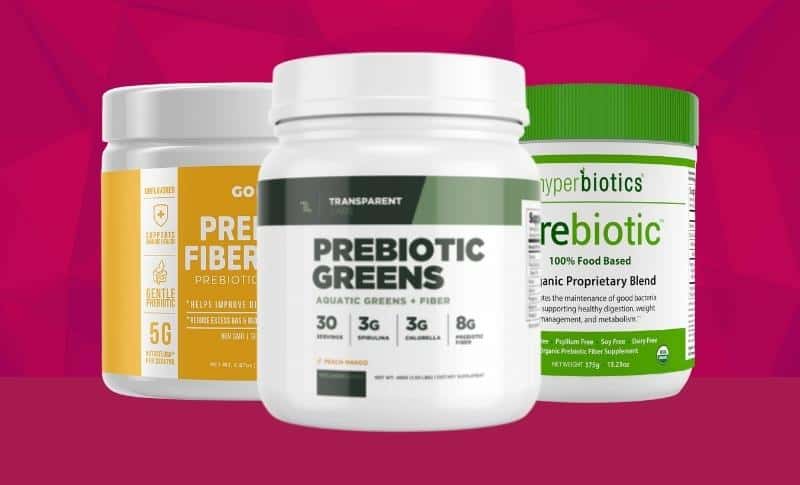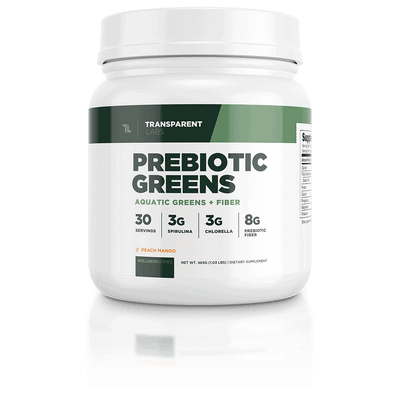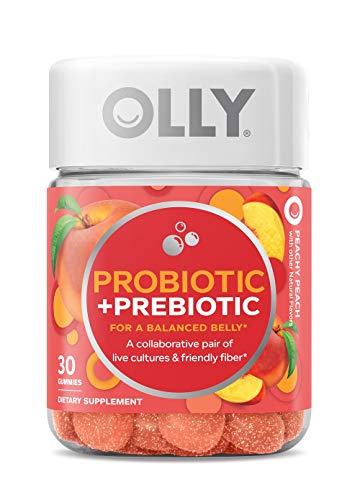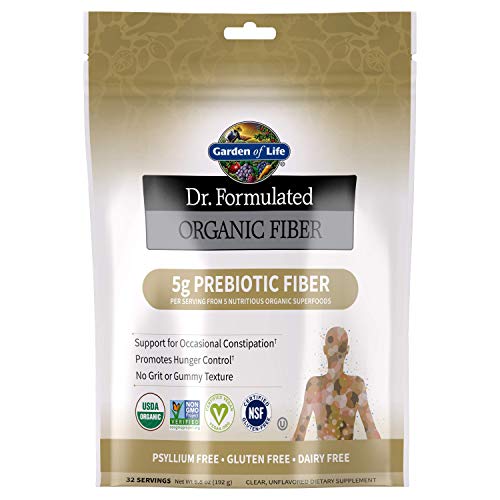Supplements
The 10 Best Prebiotic Supplements

What are the best prebiotic supplements?
The best prebiotic supplement is on this list, no doubt about it.
Prebiotics and probiotics are two key components to achieving a healthy gut. Probiotics, the “good bacteria” that live in the intestinal tract and support digestive health, a strong immune system, and overall wellness.
Prebiotics, which are nutrient-rich, plant-based fibers, act as the food source for probiotics in the digestive tract. Their main function is to feed and nourish the good bacteria via fermentation.
Many prebiotic-rich foods may already be in your diet, including asparagus, onion, chicory root, and whole grains.
If you’re looking for prebiotic supplements to achieve optimal gut health and improve your digestive system, keep reading.
The prebiotic supplements on this list help increase gut bacteria, and in turn, boost your overall gut health.
All these health benefits from a dietary supplement? We know!
The Best Prebiotic Supplements
Our supplement lists are created by researching the best-reviewed products from the most reputable web sources.
Here’s our list of the 10 best prebiotic supplements:
In A Rush? Here’s Our Top Pick:
10. Swanson – Prebiotic
Looking for an affordable, go-to prebiotic supplement that promotes gut flora and overall digestive health?
Swanson is a reliable, trusted company in the supplement space, and their prebiotic is of the highest quality.
Scientific experts and third-party labs test their supplements to ensure purity and potency.
Pros
- 750 mg of prebiotics per capsule for maximum digestive wellness
- 120 veggie capsules per pack
- Stimulates the growth of microflora in the digestive system
- Swanson has 50 years of science-backed health supplements
- 30-day money-back guarantee
Cons
- Some users claim this supplement upsets their stomach
9. Vitamin Bounty – Prebiotics
Nourish your gut and achieve a balanced microbiome with Vitamin Bounty!
This prebiotic targets and supports the good bacteria in your gut when paired with a probiotic regimen.
Pros
- Non-GMO, gluten-free, vegan
- Formulated for both men and women
- 15 mg of prebiotic digestive support per serving
- 30 capsules per bottle, 1 month supply
- Bottled in an NSF certified facility, made in the USA
- Supports the growth of gut bacteria for immune system support
Cons
- Some reviewers claim the packaging of this product was poor when they received it
8. Nature’s Way – Fortify
For science-backed probiotic strains, Nature’s Way offers an effective daily probiotic + prebiotic blended supplement.
Other prebiotic supplements that offer a blended version typically don’t focus on the prebiotic fiber in their formula.
Fortify is safe (and recommended) to take every day as a probiotic supplement and may improve your immune system and digestive balance.
Pros
- Non-GMO Verified, no artificial colors
- 30 billion active probiotic cultures per capsule
- 11 probiotic strains for digestive balance and immune health
- Sourced from organic blue agave inulin, chicory root, and gum acacia fiber
- Helps prevent occasional gas, bloating, and constipation
- Replenish your digestive tract with delayed-release capsules that resist stomach acid to deliver probiotics to the intestine
Cons
- Some users claim this product causes constipation
7. OLLY – Probiotic + Prebiotic Gummy
If you prefer your supplements in gummy form, look no further than OLLY!
Each gummy contains 500 million CFU to help support a healthy digestive tract. Keep your natural flora balanced and your immune system strong and ready for anything.
Containing an optimal amount of prebiotic fiber, this probiotic supplement in a chewable gummy is a dream come true.
The live cultures in this probiotic, paired with the prebiotic fibers, will support your gut health all year round.
Pros
- Gluten-free, no artificial flavors or colors
- 30 gummies (1 month supply) per bottle
- Allergen-free
- Powerful combination of prebiotics and probiotics to promote healthy digestion and gut flora
- Nourishing the good bacteria in your digestive tract
- Keeps things balanced and regular
Cons
- Contains xylitol, which may cause some stomach issues
6. Garden of Life – Dr. Formulated Organic Fiber
The Garden of Life prebiotic fiber blend is gluten-free, organic, and supports healthy digestion for men and women.
This carefully crafted prebiotic uses five sources of fiber to let probiotic bacteria grow and flourish in the digestive tract, promoting immune health and digestive balance.
Pros
- USDA Organic, third-party certified, certified Vegan, gluten-free
- Fiber sources include baobab fruit, apple peel, orange peel, cranberry fruit, and acacia
- 32 servings per container
- May curb hunger when paired with a probiotic on a weight loss plan
- Made without artificial sweeteners, flavors, colors, or chemicals
- Non-GMO, zero synthetic ingredients, psyllium-free
- Mix a tablespoon with the beverage of your choice and go about your day
Cons
- Some reviewers claim the powder doesn’t mix or dissolve easily
5. Bio Schwartz – Advanced Prebiotic
Feed the good bacteria in your gut to promote digestive health, lower cholesterol, blood sugar levels, and boost the immune system.
Support gut health and take care of your body from the inside out with Bio Schwartz.
The prebiotic fibers work to create the perfect biome in your digestive system to better absorb nutrients and essential amino acids.
The more nutrients the probiotics in your gut can digest, the better you will feel.
Good bacteria present in the digestive tract = happy digestive system!
Pros
- Non-GMO, gluten-free, dairy-free
- Made in the USA, third-party tested
- 100% satisfaction guarantee
- Reduce symptoms like bloating and diarrhea by nourishing the flora of the intestinal lining to promote regularity
- Tested several times for purity, quality, and potency
- Allergen-free, including no peanuts, soy, sugar, tree nuts, or wheat
Cons
- Some reviewers who purchased the product specifically for relief from bloating did not see positive results
4. Hyperbiotics – Prebiotic
Hyperbiotics is a powder-based prebiotic supplement containing a wide range of fibers, including acacia, artichoke, and green banana flour.
Improve your microbial health with this proprietary blend while supporting the gut barrier that protects you from harmful bacteria and increases your quality of life in the process.
Friendly probiotic bacteria are essential to keeping your digestion regular.
Together, this blend of prebiotics and probiotics can drastically improve your immune system, digestion, and gut health.
Pros
- Organic proprietary blend, 100% food-based prebiotic fibers
- 375 grams per serving, 54 servings per container
- Mix of inulin, FOS, resistant starch, and dietary fibers designed to support gut health and immune system function
- Can help support weight management, energy levels, brain function, and mental clarity
- Deters unfriendly yeast and bacteria from growing in your gut
- Designed for those with stomach sensitivities; naturally occurring ingredients help to avoid an upset stomach in this prebiotic supplement
Cons
- Product sells out quickly on Amazon
- For the first few weeks, this product may cause excessive gas for some people
3. GoBiotix – Prebiotic Fiber Boost
Few prebiotic supplements can boast of being organic, plant-based, AND keto. Meet GoBiotix. They understand the challenge of getting enough prebiotic foods each day.
This keto prebiotic fiber supplement can do wonders for your digestive tract; from easing constipation and gas to balancing blood sugar and increasing energy levels, GoBiotix checks all the boxes.
Pros
- Powder-based, 189 grams of prebiotics per serving
- One daily serving in your favorite beverage will accelerate metabolism while fighting the growth of unfriendly bacteria in your gut
- Provides relief for those suffering from irritable bowel syndrome (IBS)
- Contains only real food ingredients that are organic, sprouted, vegan, and paleo
- No artificial flavors or refined sugar
- Zero hydrogenated oils, pesticides, herbicides, hormones, or antibiotics
Cons
- High price point per serving
2. Dr. Tobias – Prebiotics
Dr. Tobias offers a clean, vegan prebiotic supplement that supports gut health through healthy digestion and immune response.
When paired together, prebiotics and probiotics can solve digestive tract issues that many people experience on a daily basis.
This duo creates a healthy microbiome to also reduce cholesterol, support heart health, weight management, digestive enzymes, and more.
Pros
- Formulated with PreforPro, an advanced prebiotic technology
- Contains specialized plant fibers that stimulate the growth of friendly bacteria
- 30 capsules per container
- Vegan and non-GMO
- Reduce gas and bloating in the gastrointestinal tract
- Supports natural digestion
- Manufactured in a GMP-certified facility
Cons
- Expensive price point per serving
1. Transparent Labs – Prebiotic Greens
Ready to meet your dietary fiber needs in one green drink? Then Transparent Labs Prebiotic Greens is the best choice for you.
It’s no easy feat to make the #1 spot on any of our product lists. Transparent Labs Prebiotic Greens makes the cut because its formula takes prebiotics to the next level.
Each serving contains 3 grams of spirulina and chlorella, nutrient-rich in vitamins, minerals, protein, and heavy-metal detoxification.
The prebiotic fibers in this formula provide a gut-healthy approach to supplementing and supporting your digestive tract to achieve optimal health and wellness.
Pros
- Gluten-free, non-GMO
- 8 grams of prebiotic fibers per serving
- Made without sweeteners, coloring, or preservatives
- Low-carb, less than 1 gram of sugar per serving
- Fiber-packed, gut flora friendly formula that includes the most mineral-dense foods you can consume
- Each serving contains 3 grams of algae greens and prebiotic fibers to achieve the optimal combination of healthy bacteria in your gut
- 30 servings per container
- Can be taken with a glass of water daily
Cons
- Most expensive product per serving on this list
FAQs About Prebiotic Supplements
There’s a lot to consider when deciding on the best prebiotic supplement to take.
In this section, we’re answering the frequently asked questions about prebiotic supplements to help you narrow down your search and select the best option for your body.
Q: What do prebiotic supplements do?
Prebiotics are plant fibers that act as food for the probiotics (or “friendly bacteria”) in a healthy gut.
The more prebiotics and probiotics that exist in your digestive tract, the healthier your digestive system operates as a whole (lack of gas, constipation, and other uncomfortable digestive issues).
Prebiotic supplements are typically capsules, powders, or gummies containing dietary fibers like inulin or FOS, which help nourish and stimulate the growth of healthy bacteria in the gut.
Q: How do prebiotics help your body?
Prebiotics and probiotics work hand in hand to keep the gut and digestive system healthy and operating normally.
Prebiotics help to strengthen gut health by nourishing and increasing good bacteria in the intestinal tract and help reduce constipation and other digestive issues.
They also help reduce inflammation, protect the body from disease, and can even reduce allergies.
Prebiotics are in many healthy foods that we already eat, including asparagus, onion, chicory root, Jerusalem artichokes, garlic, bananas, oats, and apples.
Eating a healthy diet including these foods will ensure you are taking the necessary steps to support your gut health and alleviate your body’s digestive process.
Q: Is it good to take prebiotics every day?
While there is no official amount of prebiotics that should be consumed per day, there are fiber recommendations that men and women should consume in their diet each day.
For men, a recommended 38 grams of fiber per day is the general rule of thumb. For women, it’s 25 grams per day.
Studies suggest that eating 3 to 5 grams of prebiotics a day can benefit your health, but there are not any official guidelines (yet).
If you’re getting the recommended fiber intake each day, you’re likely getting enough prebiotics and probiotics.
Q: When should I take prebiotics?
If you already have a supplement or vitamin routine, then adding a prebiotic supplement is the easiest way to keep yourself on track.
If you’re already taking a probiotic, great! Take that first, wait 10 minutes, then take your prebiotic. The two can interact too early and cause temporary bloating.
It’s best to take both supplements on an empty stomach with a glass of water before a meal.
Q: How long do prebiotics take to work?
The most important part of taking a prebiotic is consistency. If you can commit to taking a prebiotic daily, that’s the best way to experience the health benefits quickly.
The longer you take the supplements, the better. Remember, you are nourishing the good bacteria in your gut, which takes time and creates long-term benefits that you may not notice right away.
The prebiotics work even if you don’t feel any different — they’re setting up your digestive tract to be an environment consisting of healthy bacteria.
Summary
There you have it!
The 411 (and then some) on prebiotic and probiotic supplements and how these can boost your immune system, support and improve gut health, and get you living a better life from the inside out.
We’re confident the prebiotic supplements on this list offer something for everyone and will quickly become a go-to item within your supplement regimen.
Here’s a quick recap of the 10 best prebiotic supplements:
- Transparent Labs – Prebiotic Greens
- Dr. Tobias – Prebiotics
- GoBiotix – Prebiotic Fiber Boost
- Hyperbiotics – Prebiotic
- Bio Schwartz – Advanced Prebiotic
- Garden of Life – Dr. Formulated Organic Fiber
- OLLY – Probiotic + Prebiotic Gummy
- Nature’s Way – Fortify
- Vitamin Bounty – Prebiotics
- Swanson – Prebiotic










